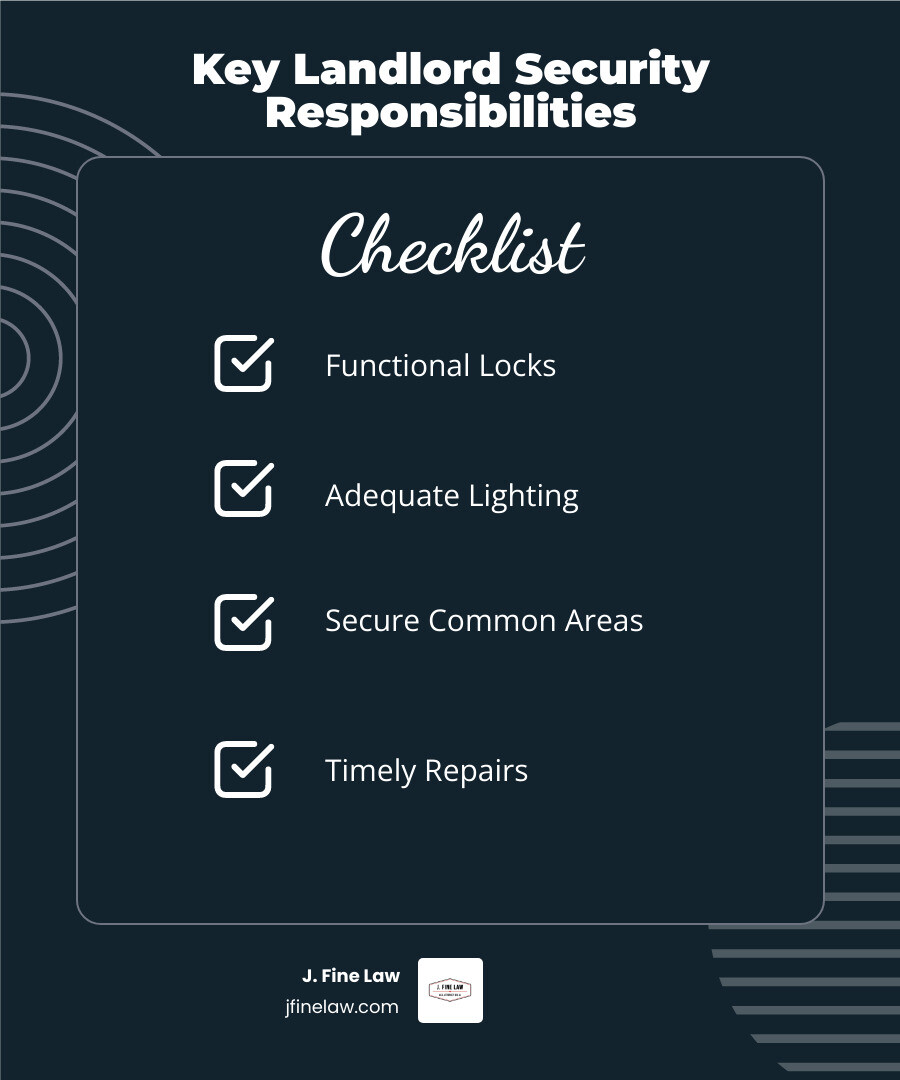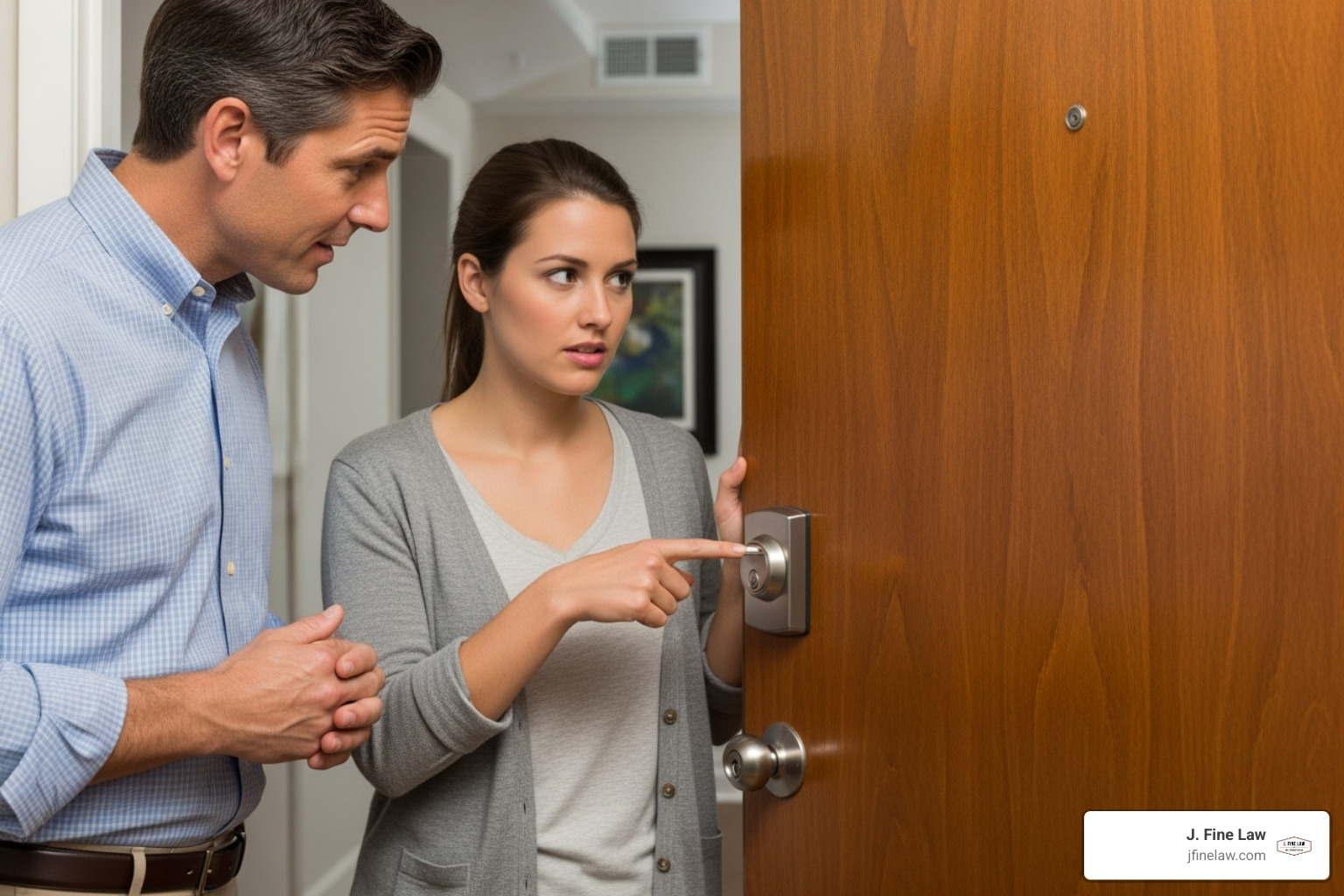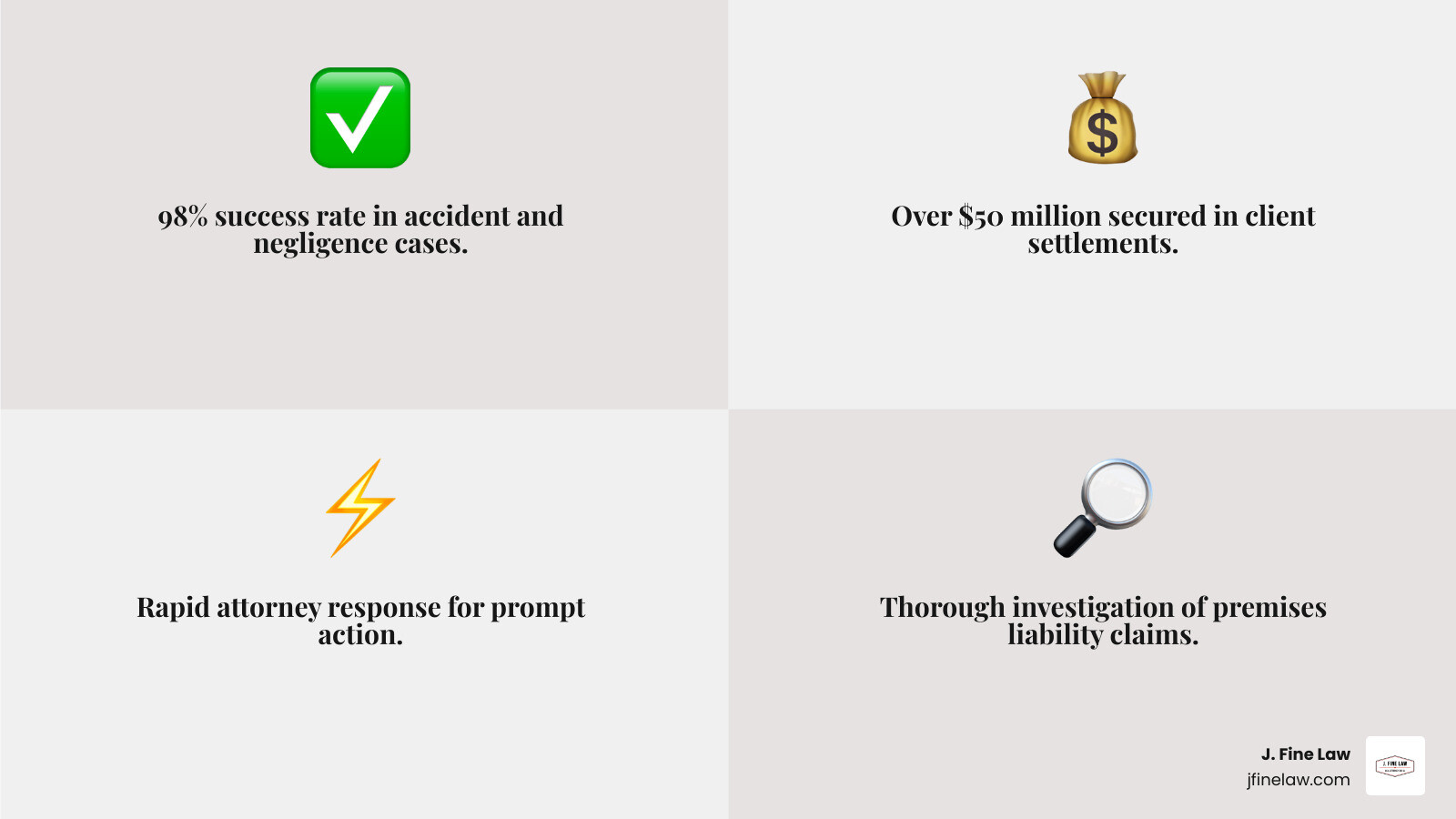Beyond Rent and Leases – Your Right to a Secure Home
Landlord responsibility security goes beyond collecting rent. When you rent a home, your landlord has legal duties to keep you safe from foreseeable harm.
Key Landlord Security Responsibilities:
- Provide functional locks on all exterior doors and windows
- Maintain adequate lighting in common areas, stairwells, and parking lots
- Repair security hazards like broken gates, faulty intercoms, or damaged locks
- Respond to known dangers such as prior criminal activity on the property
- Ensure secure access to mailboxes and building entrances
- Follow proper entry procedures with 24-hour notice except in emergencies
In Pennsylvania and New Jersey, the law requires landlords to maintain properties to protect tenants from reasonably foreseeable criminal acts. This “implied warranty of habitability” means they cannot ignore security concerns or delay essential safety repairs.
When landlords fail in these duties, tenants can suffer serious injuries from assaults, break-ins, or accidents. Knowing your rights helps you recognize when a landlord’s negligence becomes dangerous.
I’m Jason Fine, a Pennsylvania Super Lawyer with over 25 years of experience holding negligent landlords accountable for landlord responsibility security failures. I’ve secured substantial settlements for tenants injured by inadequate property security and understand what it takes to prove these complex cases.
Core Duties: What Landlord Responsibility for Security Entails
When you rent a property, you enter an agreement where your landlord assumes legally-binding duties to keep you safe. Landlord responsibility security isn’t just good business practice—it’s the law.
Your landlord must maintain the property in good repair and fit for human habitation, following all health and safety codes. This duty extends beyond your front door to common areas like hallways, stairwells, and parking lots. I’ve seen many cases where poor lighting or broken railings in these areas led to serious, preventable injuries.
Crucially, landlords must respond to complaints about hazards and address foreseeable dangers. If they know about a broken gate, a faulty intercom, or a pattern of criminal activity, they cannot ignore it. This failure is negligence that can lead to legal consequences.
Property maintenance also covers structural integrity and pest control. A landlord who lets mold grow or ignores a serious rodent problem is failing their legal duty to provide a secure living environment.
The Foundation: Locks, Lighting, and Safe Entryways
The basics of landlord responsibility security start with fundamentals like deadbolts, window locks, and proper lighting. These are not luxury upgrades but essential safety features for every rental property.
Your main entry door needs a functional deadbolt, and windows require working locks, especially on ground floors. I’ve handled cases where missing or broken locks made break-ins almost inevitable. Smart landlords also change locks between tenants, as you never know how many copies of an old key exist.
Exterior lighting is a critical crime deterrent. Well-lit walkways, parking areas, and entrances help prevent crime and accidents. Functional intercoms control building access, and secure mailboxes protect your personal information.
These measures create a “reasonably safe environment.” For more information, see a guide to landlord-tenant law in New Jersey. If you’ve been hurt, understanding Negligent Security can help you know your options.
Responding to Known Dangers and Repairing Hazards
Security requires ongoing vigilance. Landlords must address emerging dangers and make timely repairs when things break. This is a crucial part of landlord responsibility security.
Consider a broken gate or faulty locks on a main entrance that tenants have reported. When landlords know about these problems—or reasonably should—they have a legal duty to fix them promptly.
Prior criminal activity on or near the property creates special obligations. If a pattern of crime exists, your landlord may need to upgrade security with better lighting, cameras, or even security personnel.
Repairs must be made in a “reasonable time,” which depends on the problem’s severity. My advice: document everything. Send written notices about security problems, keep copies of communications, and log phone calls. This paper trail is invaluable if you need to prove your landlord knew about a hazard but failed to act.
Pest infestations and structural integrity issues also fall under security responsibilities, as they can threaten your health and safety and make a unit uninhabitable.
For expert insights, see how a Negligent Security Lawyer Explains the process of holding landlords accountable.
Tenant Privacy and Rules for Landlord Entry
While landlords have security duties, you have an equally important right to quiet enjoyment of your home. Balancing these needs is an essential part of landlord responsibility security. Your rental unit is your private sanctuary.
The rule is proper notice for entry—typically 24 hours written notice stating the reason, date, and time. Entry is usually restricted to reasonable business hours.
Emergency exceptions exist for true crises like fires or burst pipes, but not for a landlord’s convenience.
Illegal entry and landlord harassment are serious violations of your rights. Entering without proper notice, for invalid reasons, or changing locks without giving you new keys are illegal actions for which you have recourse through the courts.
Valid reasons for landlord entry include necessary repairs, inspections, showing the unit to prospective tenants, pest control, or genuine emergencies. Landlords cannot enter just to “check up” on you. We take these privacy violations very seriously, as your home should feel safe and private—a legal right, not just an idea.
When Security Fails: Holding a Landlord Accountable
Unfortunately, despite their legal duties, landlords sometimes fail in their landlord responsibility security. When this happens, and that failure leads to harm – whether it’s a physical injury from an assault due to a broken lock, or property damage from a break-in facilitated by poor lighting – you have recourse.
Your ability to seek justice hinges on documenting negligence. This means keeping meticulous records of all communication with your landlord regarding security concerns, repair requests, and any incidents that occur. Without proper documentation, proving your case can be an uphill battle.
If your landlord’s negligence directly leads to a security breach or injury, you may have grounds for legal action. This can result in financial compensation for your injuries, medical bills, lost wages, and even pain and suffering. Filing a complaint with the appropriate authorities, or directly initiating a lawsuit, can hold landlords accountable for their failures. It’s about ensuring that landlords take their duties seriously and that tenants can live in safe environments.
Understanding a Negligent Security Claim
At J. Fine Law, we specialize in premises liability law, which is the legal framework that governs a property owner’s responsibility for injuries that occur on their property. When it comes to landlord responsibility security, a negligent security claim arises when a landlord’s failure to provide adequate security leads to foreseeable harm, such as an assault or theft.
To successfully pursue a negligent security claim, we need to prove several key elements:
- Duty: The landlord owed a duty of care to the tenant to provide a reasonably safe and secure environment. As we’ve discussed, this duty is inherent in the landlord-tenant relationship and reinforced by habitability laws.
- Breach of Duty: The landlord breached that duty by failing to provide adequate security measures or by neglecting to repair known security hazards. This could involve anything from not installing proper deadbolt locks to failing to address poor lighting in a common area.
- Causation: The landlord’s breach directly caused or contributed to the security incident and your resulting injuries. For example, if a faulty lock allowed an intruder entry, leading to an assault, the broken lock is a causal factor.
- Damages: You suffered actual damages as a result of the incident, such as physical injuries, emotional distress, medical expenses, lost wages, or property loss.
The concept of “foreseeable harm” is critical here. A landlord isn’t expected to prevent all crime, but they are expected to take reasonable steps to prevent crimes that are likely to occur given the circumstances. This might include a history of crime in the area or on the property itself. If a landlord knew or should have known about a risk and failed to act, they may be liable.
If you’ve suffered an injury due to inadequate security, you may be entitled to compensation for your medical bills, lost income, pain and suffering, and other damages. It’s important to remember that pursuing such a claim is complex and requires a deep understanding of premises liability law. That’s why having an experienced legal team on your side is so important.
For those in New Jersey, our Negligent Security Lawyer in New Jersey team is ready to assist.
Steps to Take After a Security Breach or Injury
If you experience a security breach or suffer an injury on your rental property due to what you believe is your landlord’s negligence, taking the right steps immediately can be crucial for your safety and any potential legal claim. This is where your proactive actions directly support your rights under landlord responsibility security.
- Prioritize Your Safety and Seek Medical Attention: Your well-being is paramount. If you’ve been injured, get immediate medical help. Don’t delay, as this creates a record of your injuries and ensures you receive necessary treatment.
- Report to the Police: For any security breach, especially if a crime was committed (like a break-in, assault, or theft), report it to the police immediately. Obtain a police report number and a copy of the report. This creates an official record of the incident.
- Notify Your Landlord in Writing: Inform your landlord about the incident as soon as possible, and always follow up with written notification. Detail what happened, when it happened, and how you believe the landlord’s negligence (e.g., a broken lock, poor lighting) contributed to the incident. Keep a copy of everything you send.
- Preserve Evidence: This is critical.
- Take Photos and Videos: Document the scene, your injuries, and any security deficiencies (e.g., broken locks, dark areas, non-functioning cameras). Take pictures from multiple angles and distances.
- Gather Witness Information: If anyone saw what happened or can corroborate your claims about the property’s security issues, get their contact information.
- Keep Records: Maintain all medical records, police reports, communication with your landlord, and any receipts for expenses incurred due to the incident.
- Avoid Making Statements to Insurance Companies (Without Legal Advice): Your landlord’s insurance company may contact you. Be cautious about giving recorded statements or signing anything without first consulting with an attorney. They represent the landlord’s interests, not yours.
- Consult with an Attorney: The complexities of premises liability and landlord-tenant law make legal guidance invaluable. An attorney can assess your case, advise you on your rights, and help you steer the legal process.
While the phrase “When Dogs Attack Lawyers Bite” might playfully refer to our aggressive pursuit of justice in specific types of cases, it underscores our commitment to advocating fiercely for our clients when their safety has been compromised. We bring that same tenacity to every negligent security claim.
How a Lawyer Can Uphold Your Right to Security
Navigating the aftermath of a security breach or injury on a rental property can feel overwhelming. You’re dealing with physical and emotional trauma, medical bills, and potentially lost wages, all while trying to understand your legal rights. This is precisely where an experienced legal team can make all the difference in upholding your right to landlord responsibility security.
At J. Fine Law, we understand the intricacies of premises liability law in Pennsylvania and New Jersey. We know what it takes to prove that a landlord’s negligence directly led to your injuries. Our team acts swiftly, conducting thorough investigations, gathering crucial evidence, and building a compelling case on your behalf. We’ll work to:
- Investigate Your Claim Thoroughly: We’ll examine the property’s security history, review maintenance records, interview witnesses, and consult with security experts to establish how the landlord’s negligence created a dangerous environment.
- Determine Liability: We’ll pinpoint exactly how the landlord’s actions or inactions breached their duty of care, whether it was failing to repair a broken lock, neglecting to provide adequate lighting, or ignoring a known history of criminal activity.
- Steer the Legal Process: Landlord-tenant laws and premises liability claims can be complex. We handle all the legal heavy lifting, from filing paperwork and negotiating with insurance companies to representing you in court, if necessary.
- Pursue Maximum Compensation: Our goal is to secure the full financial compensation you deserve for your medical expenses, rehabilitation costs, lost wages, pain and suffering, and any other damages resulting from your injuries. We have a proven track record, with over $50 million in settlements for our clients.
- Hold Landlords Accountable: By pursuing these claims, we not only help our clients recover but also send a clear message to landlords that they must take their security responsibilities seriously. This contributes to safer communities for everyone.
We pride ourselves on our rapid attorney response and a 98% success rate in accident and negligence cases. When you’re ready to explore your options, we offer a free case evaluation. We’re here to listen to your story, answer your questions, and provide clear, compassionate guidance.
Don’t let a landlord’s negligence leave you feeling helpless. We invite you to explore our negligent security case results to see how we’ve helped others facing similar situations. Your security is our priority, and we are committed to fighting for the justice you deserve.




